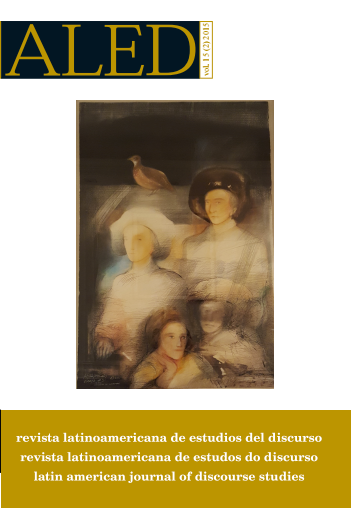Neoliberalismo en el discurso de Manuel Santos
Estrategias discursivas
Keywords:
neoliberal discourse. political discourse. economics. semiotics of power.Abstract
The debate on neoliberal discourse regarding economics has not acknowledged the market failure due to, among other factors, varying degrees of power anchored in commercial activity, uncertainty, external forces acting on production and consumption, and large-scale production, so the phenomenon seems to be open-ended. The Colombian case allows us to identify the general tendency to suppress social rights in Latin America, associated with the particular characteristics of the development of the internal armed conflict based on an old dispute between different social actors around the forms of wealth distribution, thereby revealing the axis on which the public sphere is built. The discursive practices and semiotic constructions that contribute to stabilizing the neoliberal model are identified in a Colombian presidential speech. The shift from the representation of the economic environment to the different areas of social life and its potential effects on the stabilization of a “semiotics of power” is examined. Colombian President Juan Manuel Santos inaugural address of August 7 2014 is analyzed. Different categories taken from critical discourse studies, semiotics, sociology and political science are used to illustrate the semiotization ways through which the representational systems underlying the neoliberal regime are stabilized in political discourse.
Downloads
References
Bauman, Z. 2009. Modernidad líquida. Buenos Aires: Fondo de Cultura Económica.
Bourdieu, P. 2012. La distinción. Criterio y bases sociales del gusto. Buenos Aires: Taurus.
Deleuze, G. y Guattari, F. 2013. El anti edipo. Capitalismo y esquizofrenia. Buenos Aires: Paidós.
Deleuze, G. y Guattari, F. 2012. Mil mesetas. Capitalismo y esquizofrenia. Valencia: Pre-Textos.
Guattari, F. 2013. Líneas de fuga. Por otro mundo de posibles. Buenos Aires: Editorial Cactus.
Fabbri, P. y Marcarino, A. 2011. El discurso político. DeSignis 2: 17-32.
Fairclough, N. y Fairclough, I. 2012. Political discourse analysis: A method for advanced students. London: Routledge.
Foucault, M. 2012. Nacimiento de la biopolítica. Buenos Aires: Fondo de Cultura Económica.
Friedman, M. 2008. Capitalismo y libertad. Ensayos de política monetaria. Madrid: Síntesis.
Klein, N. 2011. La doctrina del shock. El auge del capitalismo del desastre. Buenos Aires: Paidós.
Kress, G. y Leeuwen, T. 1996. Reading images: The grammar of visual design. London: Psychology Press.
Leghissa, G. 2012. Neoliberalismo. Un’introduzione critica. Roma: Mimesis.
Pardo Abril, N. 2014. Discurso en la Web. Pobreza en YouTube. Bogotá: Universidad Nacional de Colombia.
Pardo Abril, N. 2013 [2007]. Como hacer análisis crítico del discurso. Una perspectiva latinoamericana. Bogotá: Universidad Nacional de Colombia/ IECO.
Downloads
Published
How to Cite
Issue
Section
License

This work is licensed under a Creative Commons Attribution-NonCommercial-NoDerivatives 4.0 International License.
The authors retain the copyright and guarantee RALED the right to be the first publication of the work as well as a Creative Commons Attribution License that allows others to share the work with recognition of authorship and the initial publication in this journal.




